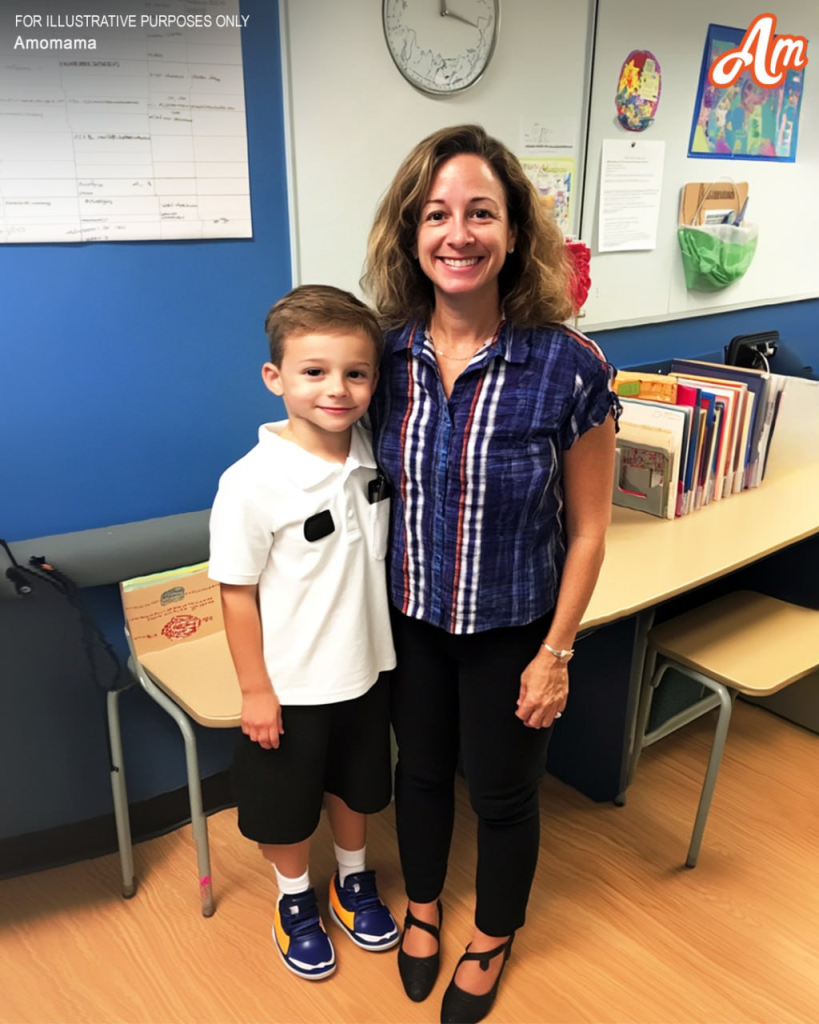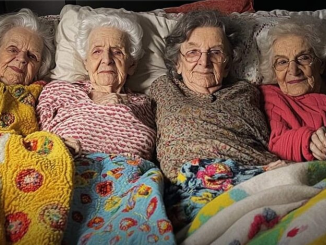
It’s spooky season—a time for fun, scares, and a bit of darkness. During this time of year, we expect to see creepy decorations everywhere. It’s not yet time for the cheerful holiday season.
However, just because Halloween is near doesn’t mean we can’t show kindness. One Halloween fan shared this message in a TikTok video that has since gone viral.
Salena Webb loves Halloween. She is a mother of four from South Carolina, and like many others, she celebrates by decorating her yard with Halloween items. Salena created a whole graveyard scene in her front yard, complete with ghosts, spiderwebs, pumpkins, a witch, tombstones, and skeletons carrying a casket. It took a lot of time to set up the display. But when her neighbor came to ask her to take it down, she agreed.
Her neighbor asked her to remove some decorations to make things easier for his elderly father.
Salena shared the moment her neighbor visited her to make the request in a TikTok video. In the video, the neighbor explains, “Hey, I know you’re celebrating Halloween. My dad just got diagnosed with lung cancer. He thinks the decorations are a bit scary.” He then points to the graveyard scene and asks, “Would you mind taking just the casket out?”
Salena felt sympathetic right away. Since her neighbor’s dad often spends time in his garage, which faces her yard, she understood why removing the casket was important. “I didn’t want to be a reminder of what could happen if he doesn’t beat cancer,” she told Insider. “I didn’t want to add stress to someone else’s life.”
Salena removed the casket and gave the skeletons badminton rackets instead. She moved the more scary decorations to her backyard. “I was a little sad at first,” Salena wrote in her TikTok caption, “But I realized that taking away the casket wouldn’t hurt me, but it might help my neighbor feel better as he deals with this news. Kindness is free, and compassion goes a long way.”
Many people praised Salena for her kindness. She posted the video and asked her followers what they would have done in her situation. While some said they wouldn’t have taken down their decorations, many praised Salena for her compassion.
“Now this is what being a good neighbor is all about. Kindness doesn’t cost anything. Thank you!” one user commented.
Another person wrote, “This was beautifully handled. The world needs more people like you! God bless you!”
Salena’s neighbor also appreciated her gesture. After she took down the casket, she brought him a card and some balloons. Even though there was a language barrier between them, she could tell he was thankful. He told her, “You’re good people.”
I DIDN’T GET WHY MY BEST STUDENT REFUSED TO PERFORM IN THE SCHOOL CONCERT — UNTIL I SAW WHO HIS DAD WAS

The auditorium buzzed with the expectant energy of parents and students, a sea of faces eager for the school’s annual concert. I stood backstage, a knot of anxiety tightening in my stomach. Jay, my prodigy, my star pupil, was nowhere to be found.
When I first met Jay, I was a fresh-faced music teacher, barely a week into my new role. The reality of wrangling a classroom of energetic children had quickly shattered my romanticized notions of teaching. I’d begun to question my career choice, wondering if I’d made a terrible mistake.
Then Jay sat at the piano. His small hands, seemingly too delicate for the instrument, moved with a surprising confidence. The music that flowed from him was breathtaking, a complex symphony that belied his age and lack of formal training. He was a natural, a raw talent that shone like a diamond in the rough.
I offered him private lessons, eager to nurture his gift. He hesitated, his eyes darting away, and eventually declined. I noticed his solitary nature, his avoidance of the other children, and a sense of unease settled within me. I suspected there was more to Jay’s quiet demeanor than met the eye.
Determined to help him, I offered to teach him without charge. Over the following weeks, we spent hours together, exploring the world of music. Jay absorbed knowledge like a sponge, mastering complex pieces with an almost uncanny speed. He was ready, more than ready, for his debut performance.
But on the day of the concert, he vanished. I searched frantically, my anxiety escalating with each passing minute. Finally, I found him huddled backstage, his small frame trembling, his eyes wide with fear.
“Jay, what’s wrong?” I asked, my voice gentle.
He whispered, his voice choked with terror, “I have to go on… before my father sees me!”
“Why?” I asked, confused. “Why wouldn’t your father want to see you play?”
His eyes widened, and he looked over my shoulder. I turned, and the breath hitched in my throat.
Standing at the entrance to the backstage area was a man I recognized all too well: Richard Thorne, the renowned concert pianist, a man whose name was synonymous with musical genius. He was also Jay’s father.
Richard Thorne was a legend, a figure I had admired from afar for years. His performances were legendary, his technique flawless. But his reputation was also marred by whispers of a cold, demanding perfectionism, a relentless pursuit of excellence that left little room for human frailty.
Suddenly, Jay’s fear, his reluctance to perform, his solitary nature, all made sense. He wasn’t just a talented child; he was the son of a musical titan, a man who likely held his son to impossibly high standards.
Richard’s gaze landed on Jay, and his expression was unreadable. He strode towards us, his presence filling the small backstage area.
“Jay,” he said, his voice low and commanding, “what are you doing here?”
Jay shrank back, his eyes filled with terror. “I… I was going to play,” he stammered.
Richard’s eyes narrowed. “You were going to play? Without my permission?”
“I… I wanted to,” Jay whispered.
Richard’s expression hardened. “You are not ready,” he said, his voice laced with disdain. “You are not even close.”
Jay’s shoulders slumped, his face crumpling with disappointment. I felt a surge of anger, a protective instinct rising within me.
“Richard,” I said, my voice firm, “Jay is incredibly talented. He’s been working hard, and he’s ready to share his gift.”
Richard turned to me, his eyes cold. “You presume to know my son better than I do?”
“I know he loves music,” I said, my voice unwavering. “And I know he deserves a chance to express himself.”
A tense silence filled the air. Richard’s gaze shifted back to Jay, and for a moment, I saw a flicker of something in his eyes, a hint of vulnerability.
“Jay,” he said, his voice softer, “if you truly want to play, then play. But you must understand, you will be judged. You will be compared. And you must be prepared for that.”
Jay looked at his father, his eyes filled with a mixture of fear and determination. He nodded, his small frame straightening.
“I’m ready,” he said, his voice barely a whisper, but filled with a quiet strength.
Richard stepped aside, allowing Jay to pass. Jay walked onto the stage, his footsteps echoing in the hushed auditorium. He sat at the piano, his hands trembling slightly.
Then, he began to play.
The music that filled the auditorium was breathtaking. It was Jay’s music, his interpretation, his soul poured into every note. It was not a perfect performance, not a flawless rendition of a master’s work. But it was beautiful, raw, and filled with a passion that resonated with every soul in the room.
When he finished, the auditorium erupted in applause. Richard Thorne stood at the back of the room, his face unreadable. But as Jay walked off the stage, Richard reached out and placed a hand on his son’s shoulder.
“You played well,” he said, his voice low. “But you can do better.”
Jay looked up at his father, his eyes filled with a quiet understanding. He nodded, a small smile playing on his lips. He knew that his journey had just begun, and he knew that he had the strength to face whatever challenges lay ahead. He had found his voice, and he would not be silenced.



Leave a Reply